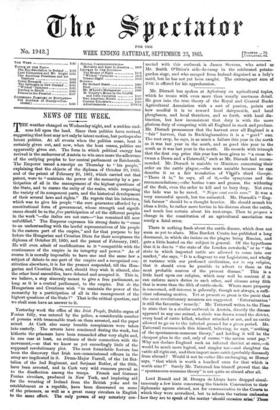There is nothing fresh about the cattle disease, which does
not seem as yet to abate. Miss Burdett Coutts has published a long document, in which she insists on the plague being Russian, and gets a little heated on the subject in general. Of the hypotheses that it is due to "the state of the London cowsheds," or to "the state in which imported cattle are allowed to come into our market," she says, "it is a disgrace to our Legislature, and wholly at variance with our professed civilization, not to say religion, that it should even be possible to advert to these as the most probable sources of the present disease." This is a little hard upon our religion, which may well be content if it can enforce men's duties to each other, and cleanse away filth that is worse than the filth of cattle-sheds. Where mere property is concerned, self-interest is generally, though not always, a suffi- cient reforming motive. Yet at present so great is the panic that the most revolutionary measures are suggested. 'Extermination' is still the favourite remedy.' Mr. Tattersall writes to the Times to state that in a similar outbreak in Austria, directly the disease appeared in any one animal, a circle was drawn round the district, every head of cattle killed, whether attacked or not, and no cattle allowed to go on to the infected ground for a given period. Mr. Tattersall recommends this himself, believing, he says, "nothing of the spontaneous-nonsense theory," and holding it will be the cheapest plan in the end, only of course "the nation must pay." Why not declare England such an infected district at once,—it would be much more logical, and simpler too—and slaughter the cattle all right out, and then import more cattle (probably diseased) from abroad? Would it not be rather like exchanging, as Homer says, "that which is worth a hundred oxen for that which is worth nine ?" Surely Mr. Tattersall has himself proved that the "spontaneous-nonsense theory" is not quite so absurd after all.






























